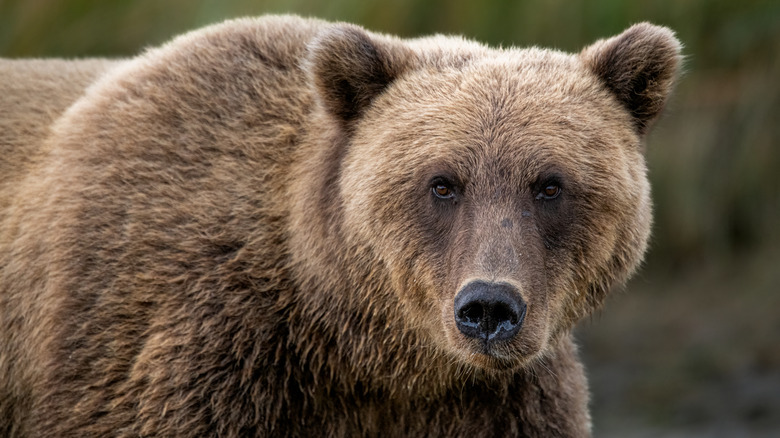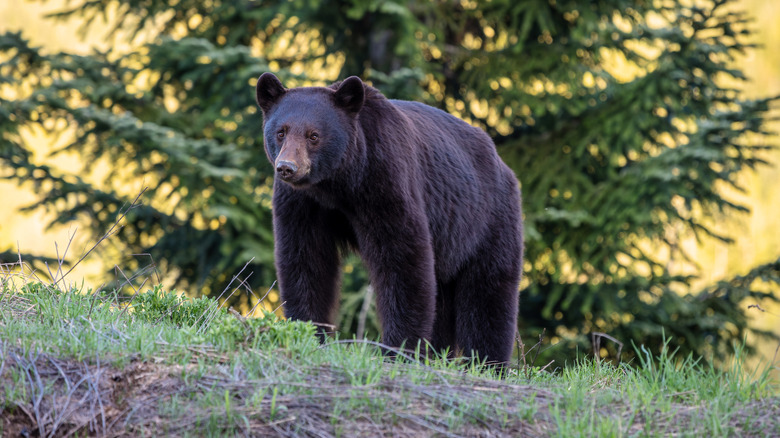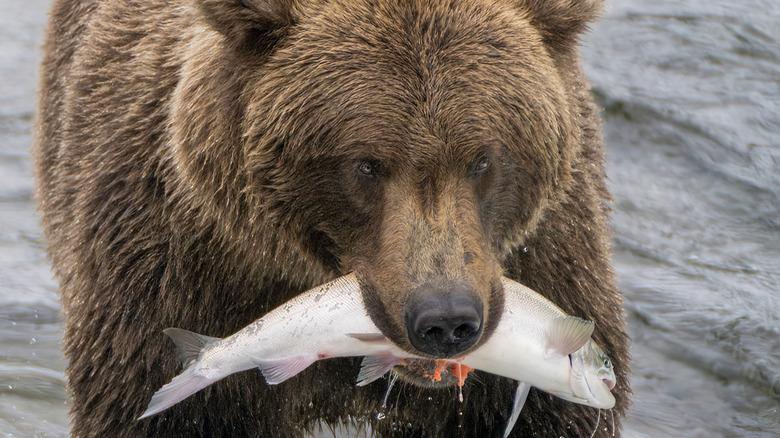What To Do If You're Out Hiking Or Camping And You See A Bear
One of the things campers and hikers have to remember when out in the wilderness is that they're likely not alone. Even if you're doing a solo hike, you're in the habitat of other creatures, and some of them may be dangerous. This includes bears, and while it may be an incredible experience to spy a wild animal from afar, having one up close may put you in danger of injury or even death. In some cases, a bear sighting may be something you're hoping for. You may have even gone out of your way to visit a national park where you're almost guaranteed to see a bear. In others, it may be a shock. Whatever the circumstance, it's important to know what to do if you encounter one. You also need to keep in mind that bears, adorable as they can be, are wild animals. No wildlife selfie is worth your life, so forget the picture and consider your safety.
The first thing to do before you head out for a hike or camping trip is to be aware of bears in the area by checking in with any visitor center, website, or backcountry office for information on recent sightings. Knowing you're going into bear country is important. You can also make sure a bear isn't going to be surprised by you by making a lot of noise when you hike. You can wear a bell (though make sure it's a loud one), talk a lot, or even sing a happy song. Bears usually like to avoid humans, so they might head in a different direction.
What to do if you see a bear while hiking or camping
If you do see a bear, the best thing you can do is stay calm. Of course, it's a frightening situation, but losing it can make you more vulnerable to attack. Stand still, speak in a calm manner, and don't scream. While you stand, wave your arms around to make yourself look big. The idea is to make sure the bear knows you're human. It's important to remember that bears are curious, so if it stands up, makes growling noises, or snaps its jaw, it's likely trying to identify what you are and warn you off. If you have children with you, slowly pick them up. Sudden movements and loud noises make you look like prey to a bear.
If you can slowly get to higher ground, do so in a calm manner. However, don't run. Bears can outrun you and climb trees, so that isn't an option. Stand still, and if you can, wait until the bear leaves. If you need to go, move slowly and sideways in the opposite direction; they don't find that sort of movement as threatening. While you may think that offering food to the bear is a good idea, don't. Doing so will make it think you have more. If you have a backpack, hold onto it as it can be a barrier between you and the bear. It's also important to make sure that anyone with you, particularly children, knows what to do in case of an encounter.
Prevention and what to do in the rare case of a bear attack
Prevention is important, and there are things you can do to avoid a bear encounter. First, hike in groups, as the noise and scent may keep a bear from approaching in the first place. Keep children close. If you do hike solo, make sure you know how to keep yourself safe and ensure someone knows where you are. It's best to hike without your dog, but if you do have one, make sure it's leashed.
Keep an eye out for bear droppings, tracks, torn-up logs, and displaced rocks. If you see these things, turn back. The same goes for large, dead animals, which you should report to the park's office. If you're camping, keep your food and garbage secure in bear-resistant containers inside lockers or your car (if the campsite allows it). Never store food where it's visible in an open car or in your tent. Wipe up spills and crumbs, and don't turn your back on your food.
Carry bear pepper spray during any recreation in areas where the animal may reside, but make sure everyone with you knows how to use it correctly. It's not the same as human pepper spray, but you use it for the same purpose. If it appears that you're being attacked in self-defense by the bear, use the spray. In the case of an attack from a brown or grizzly bear, play dead by lying on your stomach, with your hands crossed behind your neck and legs apart. It's harder to flip you that way. Stay still until the bear leaves. However, if it's a black bear or the bear is aggressive, try to escape, and if you can, fight back with whatever you have around you. The face is the best place to focus on.


